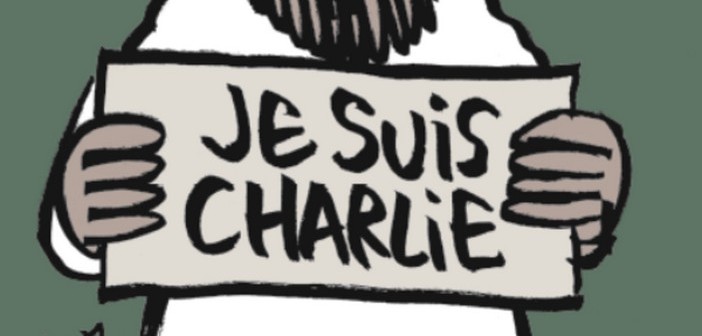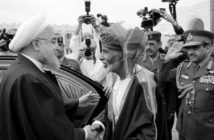As I pondered this article I sat watching my class of students in Oman completing their final exam in political science. The image was one of young Omanis from all parts of the sultanate wearing their traditional dress of abayas and dishdashas, pens furiously scrawling, as they earnestly grappled with the ideas of Adam Smith, John Locke, Karl Marx,or the father of political science, Ibn Khaldun…
Visible through the rear window of the exam room was the partially obscured golden dome of the university mosque. It was an interesting view point from which to consider the debate storming around the globe over how to explain and respond to the vicious attack by so called Islamic extremists against the offices of Charlie Hebdo magazinein Paris. A major part of this debate has revolved around the reaction, or lack of, by so called ‘moderate’ Muslims and whether or not they should show stronger outrage or regret over the attacks as a way of diffusing civilizational tensions between the West and the Islamic world. Even raising this question is, however, loaded with highly antagonizing inferences, and I found my own anger rising at thedisgraceful suggestionof any connection between the killers in Paris and my students before me.
Omanis are anxious about several things; the rapid rise of ISIS (Daesh) and its insane ideology, the danger of the cancer of sectarian conflict spreading from Syria and Iraq, the health of their beloved Sultan Qaboos who remains in Germany receiving medical treatment, and the plunging global oil price. Despite these worries calm prevailsin Muscat and around the country, and in recent days – in contrast to the polarizing debate in the West after the Paris attacks- this has not changed. Beyond official state condemnation there has been limited reaction among ordinary Omanis to the events in Paris. Should this be interpreted as a tacit approval of what happened to the cartoonists who insulted the Prophet Muhammad? This would be a misconception.Omanis, as firm believers, would never condone such insults to the image of Prophet Muhammad as perpetrated by the cartoonists, but the actions of the three terrorists who killed them are considered in even stronger terms as being an affront to Islam.Moreover, there is no sense of connection to the objectives or identity of the killers who are labeled in the West as Muslim extremists.
The term “Muslim extremist” connotes that the perpetrators resided within the boundaries of Islam, albeit the extremities of the religion. ButmostOmani Muslims are at a loss to recognise those who slaughteredunarmed people in the name of Islam in Paris or in the so-called Islamic State in recent months. As one of my more pious Omani colleagues exclaimed recently “what type of beasts are these?” However, the main concern is an almost resigned expectation of increased Islamopobia in the West. One civil servant spoke of his concern for his son studying in the US, and told him to stay relaxed and not to make any fuss and avoid doing anything that could provoke a negative reaction. All of which are very Omani behavioural characteristics in any situation
Oman is renowned for its openness, toleration and friendly relations with other countries. Therefore does this mean Oman is more religiously moderate or liberal? In Western academic and media circlesthere is a constantnarrative around such concepts as moderate Islam, Islam that is more pro-Western, or Islam that is more secular leaning. This places the religion and its over 1 billion adherents on a spectrum defined according to Western ideology and values. This is of course natural to do from a Western perspective, but likewise, it is also natural that people in the Islamic world do not necessarily see it in those terms. To be Muslim and a good Muslim does not mean to be closer to things we may value in the West but to be closer to Islamic values.In the same sense to have strong Islamic values does not automatically equate to being anti-Western either. This is a common misconception and could relate more closely to the radical ideology of ISIS and al-Qaeda (who claim responsibility for the Paris attack) that seem to define themselves entirely in an inverse negative relation to the West, and in that sense they could well be considered more a “Western” ideological construct than an Islamic one.
Many expatriates living in Oman believe their highly positive experience of living in the sultanateis because it is a pro-Western country – as if to say that it is less ‘Islamic’ so to speak. In fact, Omanis are deeply religious with Islam being deeply rooted as the foundation of society. This strict adherence to the core values of Islam, whether it isIbadhi, Sunni or Shi’a interpretations, is precisely what makes Oman a stable, secure and tolerant society. This is reflected in the harmonious relations among its diverse population and also in the state’s universally friendly and constructive relations with the outside world. In contrast, autocratic regimesin other Muslim majority states, suffering from legitimacy deficits, have often looked to exploit religion and religious identity as an instrument of regime maintenance. The Omani government under leadership of Sultan Qaboos Bin Said has, however, not actively intervened in closely managing religion or insulating different communities from each other’s identity, as was the case in Baathist Syria or Iraq, for example, but has rather allowed significant space for social and religious interaction to achieve its own natural equilibrium. People know and trust one another, regardless of their background, religion or sect.
While movements like “Je suis Charlie” justifiably seek to strongly respond to threats to basic freedoms upheld in liberal democracies,care should be taken not to aggravatepositive relations with the Muslim world.Framing the campaign to protect liberal democratic freedoms as a struggle between ‘moderate’ and ‘extreme’ Islam, however well intentioned, misses the point and risks antagonizing many Muslims who take umbrage at the generalised suggestion of complicity or common cause with these criminal terrorists in Paris. Western outrage over the sanctity of free expression and democratic liberties also sounds hypocritical to Muslim ears in light of apparent Western indifference to the plight of the Syrian or Palestinian people.
Meanwhile back in class the students handed back their exam scripts having expended their intellectual energy trying to understand the politics of today’s world. Some may head to the mosque and pray, others may head to McDonalds, some to both or neither. Young Omanis seeking answers within politics or religion without any compunction, essentially practicing Islam as they choose to live it neither moderate, extreme, or any other label attached to them from outside. What should they feel or do about the acts of terrorists who are as foreign to their society and faith as if they came from outer space? Their answer may be “we don’t know” but the problem was spawned in both the West and the Islamic world and therefore requires a joint solution.
A first step to ease tensions would be to understand that Islam is not the problem.





